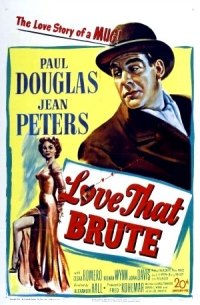Plot
In 1928 Chicago, two gangsters kill a store owner. Mobster Big Ed sends top henchman Bugsy Welch to place his trademark white carnation on the corpses to suggest that he is responsible for the murders. The police rush to arrest Big Ed, but he has an alibi: he has been in the park, where he encounters Ruth Manning, a country girl who came to Chicago to be a singer but is now a children's governess.
Big Ed falls in love with Ruth and poses as a widowed father, asking her to care for his child, with the promise of tripling her salary. When she accepts, Big Ed sends Bugsy to audition a boy to pose as his son, and Bugsy finds Harry the Kid Jr., the foul-mouthed son of a gangster. Ruth grows close to Big Ed but is offended when he gives her an expensive fur coat on Christmas Eve, thinking that he wants to buy her affection. She packs her bags to leave, but Big Ed convinces her to stay until they can find Harry a school. [3]
The next day, the mansion is surrounded by men working for Big Ed's archrival Pretty Willie Wetzchahofsky. Ruth wants to warn the police, but Mamie Sage, Big Ed's friend who is posing as a maid, dissuades her before revealing Big Ed's identity. Ruth is appalled but decides to stay until Harry is enrolled at a military academy. Meanwhile, Big Ed has reached a truce with Pretty Willie, and they agree to not interfere with each other's mob activities.
Months later, Ruth is a singer in Big Ed's former nightclub. Big Ed attends her opening night and wants to reconcile, but Pretty Willie, who is also interested in Ruth, convinces her that Big Ed is a ruthless killer. She learns that Harry has been missing from military school. After finding him, she learns through Bugsy that Big Ed has never hurt anyone in his life, and that all of his alleged victims, including Mamie's husband, are living in his basement.
Big Ed's prisoners escape and arrive at a party. Pretty Willie, disappointed that Big Ed is not as tough as Pretty Willie had believed him to be, orders his henchmen to kill Big Ed. However, Pretty Willie's men appreciate Big Ed's kindness and help him to escape while faking his death. Bugsy identifies a body as that of Big Ed, and during the funeral, Big Ed appears and surprises Ruth. She admits that she had been crushed when she thought that he had died, and they kiss. Pretty Willie arrested and Big Ed joins Ruth on a ship, where they will be married, along with Harry and Bugsy. [4]
Reception
In a contemporary review for The New York Times , critic Thomas M. Pryor wrote: "'Love That Brute,' while not a world beater by any means, is bright and breezy entertainment through most of its eighty-odd minutes' running time. Smart acting and crisp dialogue do wonders for a story which might easily have been felled by the weight of its improbabilities." [1]
Critic John L. Scott of the Los Angeles Times wrote: "Remakes are invariably not as good as the original, but this case may be rated an exception. if memory serves. ... There are some amusing touches scattered throughout the picture, with Keenan Wynn as Douglas' chief aide responsible for much of the humor. The boy adds his share, if you can stand the precocious type he portrays. Joan Davis, the always-funny comedienne, enlivens the show, too. Assorted gangster types act tough and bring laughs at the same time. Douglas plays his role fairly straight, and it's a good job." [2]
This page is based on this
Wikipedia article Text is available under the
CC BY-SA 4.0 license; additional terms may apply.
Images, videos and audio are available under their respective licenses.
